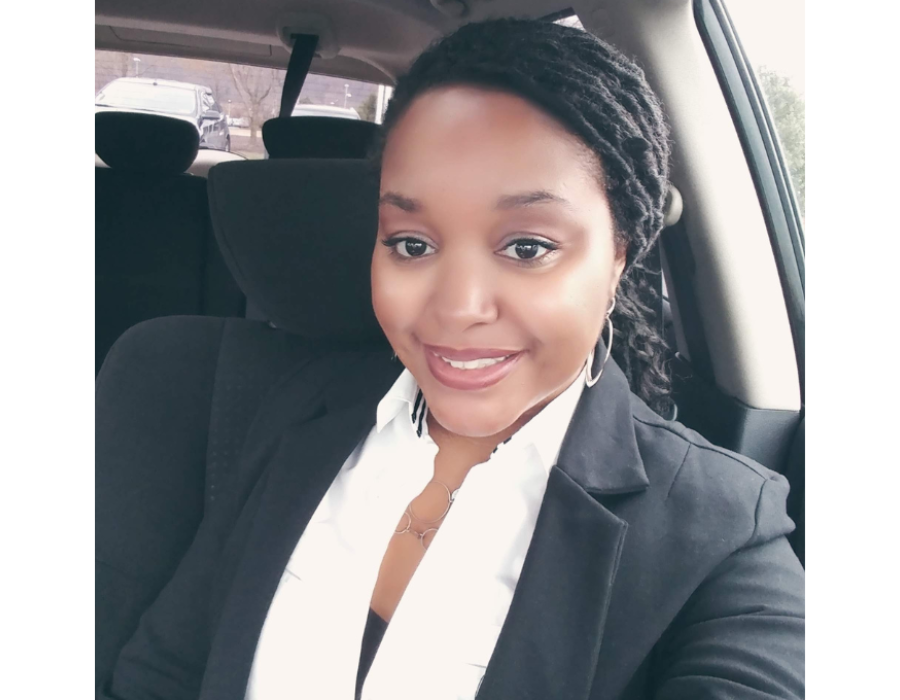
For Tanisha Heard, It’s OK to Talk about a Colonoscopy, Even Better to ‘Get to it’
Tanisha Heard is an employee of Olympus America, Inc. The statements contained herein are her experiences, thoughts, and opinions. Please talk to your doctor regarding this important topic.
When Tanisha Heard’s doctor recommended a colonoscopy and an upper endoscopy to rule out diagnoses after her unintended weight loss, she was on board. Being too young to meet the current recommended age requirement of 451 didn’t deter her. Neither did a lack of family history. As a Salesforce Adoption Analyst at Olympus, she’s heard a thing or two about the procedure—even recognizing a piece of Olympus equipment in the exam room on her procedure day. For Tanisha, it was more like: “Let’s get to it.”
It's an admiral attitude, especially for those of us more prone to ignore or deny a potential problem. “I was just hoping that if they did find something it would be early enough to treat it,” she recalled. “If they found something, it would be an answer to my question: What’s going on with my health?” To her, getting an answer was a better alternative to putting it off and worrying about it, or worse.
She was thinking about Chadwick Boseman.

Cultural and familial taboos
Like so many, Tanisha was shocked by the untimely passing of Chadwick Boseman in 2020 at 43 years of age, widely known for his Black Panther superhero role. “He was this virile, handsome man who looked like the picture of health, and the next thing you know he’s gone. And to hear he was battling [colon cancer] for four years, and he didn’t tell anybody!” except for immediate family.
“That’s why I said, ‘if there is anything wrong, I would rather know and then deal with it.’”
The American Cancer Society cites Chadwick Boseman’s “almost incomprehensive death” as an example of a sobering yet disproportionate statistic: African Americans have a 20% higher than average risk of colon cancer with a 40% higher than average mortality rate.2
The fact that the actor kept his cancer hidden strikes a chord with Tanisha. In the spirit of Black History Month, on the heels of Colorectal Cancer Awareness Month, Tanisha recognized the stigma rooted in cultural perceptions.
“I didn’t know Chadwick personally, but I definitely think that [silence] was seated in some of the things that I grew up with in my family. You don’t talk about those things. You just pray about it and it’s going to be OK.”
Faith and medicine
Tanisha’s brand of faith seems bundled with self-empowerment. She says she feels fortunate to work at Olympus for the exposure to medical advances, but also for the confidence gained from working in an environment of heightened awareness to colon cancer screening. “Some people are scared of the procedure. Others are afraid of knowing the outcome,” she considers. “But they may not know about the advances in medicine and things that can help,” all of which compelled Tanisha to “get to it.”
“The prep was excruciating but it was worth it,” said Tanisha, who was prescribed a laxative formula to drink one day before the test. Her advice to others who must do this is to plan not to work that day. As far as the procedure itself, she reported: “They removed two polyps, but there was nothing that was alarming.” After a negative biopsy and no evidence of bacterial infections, she considers both her colonoscopy and her upper endoscopy exams a success. She won’t need another colonoscopy for seven more years.
Ironically, Tanisha’s appetite has also returned and she joked that the prep may have jumpstarted it.
Overall, “I’m glad that I went through it,” she concluded. “Olympus had an impact on the importance of getting screened early,” she added. “I know the [screening] age was 50 and now it’s 45, but if you have a concern, please go.”
Learn more about colonoscopies and colon cancer at www.colonoscopytoday.com.
Spread awareness of the Colorectal Cancer Alliance’s #TheyDidntSay campaign, which sheds light on aspects of colorectal cancer that often go unnoticed, especially for African Americans. Visit: Colorectal Cancer Alliance (socialpresskit.com) for more information.
References:
1. U.S. Preventive Services Task Force. Accessed September 29, 2022. https://www.uspreventiveservicestaskforce.org/uspstf/recommendation/lung-cancer-screening#:~:text=Recommendation%20Summary&text=The%20USPSTF%20recommends%20annual%20screening,within%20the%20past%2015%20years
2. American Cancer Society. September 3, 2020. Accessed February 9, 2023. https://www.cancer.org/latest-news/colorectal-cancer-rates-higher-in-african-americans-rising-in-younger-people.html#:~:text=African%20Americans%20are%20about%2020,are%20related%20to%20socioeconomic%20status.





